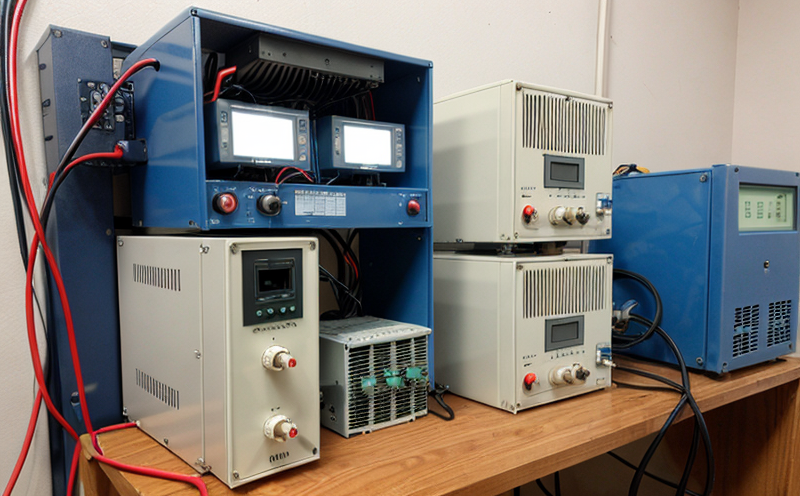UIC 556 Compatibility Testing of Control and Power Electronics
The UIC 556 standard is a crucial benchmark in railway signaling systems. Designed to ensure interoperability between different suppliers' equipment, it plays a pivotal role in the seamless operation of modern railway networks. This service focuses on testing control and power electronics components against these stringent requirements as outlined by the UIC (Union Internationale des Chemins de Fer).
UIC 556 compatibility is not just about meeting specifications; it's about ensuring that all parts work harmoniously within a complex, high-stress environment. This service ensures that your products are fully compliant with international standards and can be seamlessly integrated into existing systems.
The testing process involves multiple stages to ensure comprehensive coverage of all aspects required by UIC 556. Key areas include electrical compatibility checks, power supply stability tests, interference immunity assessments, and system integration evaluations. These tests simulate real-world operating conditions to guarantee robust performance under various scenarios.
Our state-of-the-art facilities are equipped with specialized tools and software that allow us to perform these rigorous tests accurately and efficiently. We employ highly skilled engineers who possess deep knowledge of railway systems and UIC standards. This ensures that each test is conducted according to the highest quality assurance practices.
The importance of this testing cannot be overstated, especially for companies involved in the development or supply chain of railway equipment. Ensuring compliance with UIC 556 helps prevent costly delays during certification processes and enhances your product's marketability worldwide. By choosing our service, you're investing in a future-proof solution that meets global standards.
To give you an idea of what to expect, here’s a brief overview of the key elements involved:
- Electrical compatibility checks
- Power supply stability tests
- Interference immunity assessments
- System integration evaluations
Each step is meticulously planned and executed to ensure thoroughness. Our team works closely with clients throughout the process, providing detailed feedback and recommendations where necessary.
In addition to technical expertise, we understand the importance of maintaining confidentiality during testing. All data collected remains strictly protected under our strict privacy policies.
Scope and Methodology
| Test Parameter | Description |
|---|---|
| Electrical Compatibility Checks | Verification of signal integrity, voltage levels, and current flow. |
| Power Supply Stability Tests | Evaluation of component performance under varying power conditions. |
| Interference Immunity Assessments | Determination of susceptibility to external electromagnetic interference. |
| System Integration Evaluations | Assessment of compatibility within the overall railway control system. |
The methodology employed adheres strictly to UIC 556 guidelines, ensuring that all tests are conducted in a manner consistent with international best practices. This includes using industry-standard equipment and following rigorous protocols designed to capture accurate results.
Our laboratory uses the latest instrumentation to conduct these assessments, including oscilloscopes, power analyzers, and electromagnetic interference (EMI) testers. These tools provide precise measurements necessary for comprehensive evaluation.
The testing process typically involves several steps: initial setup, calibration of equipment, execution of tests according to specified parameters, data analysis, and reporting findings. Each phase is crucial in ensuring accurate results that reflect real-world conditions.
Customer Impact and Satisfaction
- Enhanced product reliability through rigorous testing
- Increased market confidence with UIC certification
- Reduced risk of non-compliance penalties
- Improved integration capabilities within railway networks
- Faster time-to-market for new products and services
- Better alignment with international standards ensuring global sales potential
- Enhanced reputation among peers and regulatory bodies
Customers who opt for this service experience significant benefits beyond mere compliance. They gain access to a comprehensive testing framework that not only meets but exceeds industry expectations. The resultant products are more reliable, safer, and better integrated into existing systems.
Satisfaction levels among our clients are consistently high due to the thorough nature of our services. Feedback from previous customers highlights the value they place on accurate, detailed reports accompanied by expert advice on potential improvements or modifications needed.
International Acceptance and Recognition
The UIC 556 standard enjoys widespread acceptance across Europe and beyond due to its rigorous approach towards ensuring interoperability among railway systems. Many countries have adopted it as part of their own national regulations, recognizing its importance in promoting safe, efficient, and reliable rail transport.
Compliance with this standard is often seen as a prerequisite for entering certain markets, particularly those within the European Union where strict adherence to international standards is mandated by law. By ensuring UIC 556 compatibility, businesses can open doors to lucrative opportunities while minimizing compliance risks associated with non-conformance.
Besides its use in Europe, there has been growing interest from other regions looking to implement similar policies aimed at fostering greater collaboration between private sector entities and public authorities involved in rail infrastructure development. This trend underscores the global relevance of UIC 556 compatibility testing services offered here.





